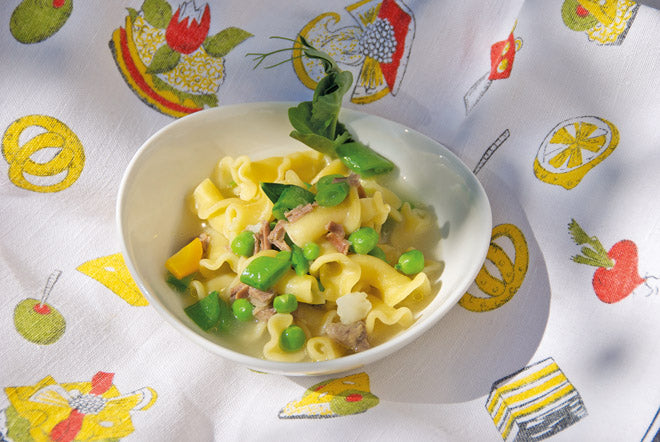
"A varied seasonal and regional diet ensures optimal nutrition for you and your baby!"
"A varied seasonal and regional diet ensures optimal nutrition for you and your baby!"
Interview on " Eating properly during pregnancy and breastfeeding " with nutrition and health experts Prof. Dr. Ingrid Gerhard and Dr. Barbara Rias-Bucher .
"Local foods - preferably organic - are harvested more ripe than imported foods and are therefore richer in nutrients; especially if you prepare your meals fresh from plant-based ingredients, you and your child will receive plenty of bioactive substances as well as sufficient protein and vital substances. Listen carefully to what is going on inside, and your baby will tell you when it wants to eat and what it needs at the moment..."
For their guide "Eating Right During Pregnancy and Breastfeeding", gynecologist Prof. Dr. Ingrid Gerhard and nutrition expert Dr. Barbara Rias-Bucher have developed a nutritional concept that focuses on seasonal and regional cuisine while taking biorhythms into account. In addition to around a hundred recipes for mother and child, the authors provide valuable tips on choosing the right foods and preparing them carefully, as well as on alleviating typical pregnancy symptoms.
During pregnancy and breastfeeding, it is particularly important to ensure an optimal supply of important nutrients and vital substances. Which foods guarantee the right nutrition for mother and child?
Prof. Dr. Ingrid Gerhard: Fruit, salad, vegetables, herbs, nuts and seeds, pulses, whole grains, potatoes, good vegetable fats - these are the foundations that keep mother and child healthy. Such a diet provides enough protein for cell growth as well as vital substances and secondary plant substances (bioactive substances) for energy metabolism and a well-functioning immune system. Those who love meat and dairy products should not overdo it, enjoy low-fat dairy products, preferably from sheep and goat, and eat a good piece of meat two to three times a week, preferably poultry.
Today, pregnancy nutrition is all about quality, not quantity. Why are organic and regionally grown foods better for a balanced diet than industrially processed food?
Dr. Barbara Rias-Bucher: Ready meals and fast food usually contain too much fat and salt, as well as preservatives and often even flavorings and/or flavor enhancers. Such additives are problematic during pregnancy and breastfeeding because they can pass to the fetus via the placenta. In contrast, local foods that you prepare fresh yourself are ideal for you and your child: vegetables, fruit, potatoes, herbs and salad from regional cultivation are usually less contaminated with pollutants because the regulations in Germany are stricter than in other countries. You should also choose organic produce as often as possible: firstly, organically grown plants produce more healthy bioactive substances; secondly, the fresher they are, the better you can utilize many bioactive substances from plant-based foods. This is why cooking yourself with local, seasonal foods is so important for mother and child. Other arguments: what grows here can be harvested when ripe, does not need to be transported long distances, tastes better and often even alleviates pregnancy symptoms.
Babies and small children are much more sensitive to environmental toxins than adults. Which foods or luxury items should expectant mothers avoid for the good of their child?
Prof. Dr. Ingrid Gerhard: Alcohol and nicotine should be avoided completely, coffee and caffeinated drinks should be greatly reduced. Simple carbohydrates such as sugar - including in cakes and sweets - peeled rice, bread and pasta made from white flour should be limited. Fish should be avoided completely, as unfortunately all fish today are far too heavily contaminated with toxins that disrupt the baby's brain development.
A diet based on plant products is optimal during pregnancy and breastfeeding. Is a vegetarian diet also recommended here?
Dr. Barbara Rias-Bucher: If you regularly eat dairy products and eggs every now and then, if you like tofu and pulses, and above all if you make sure you eat a varied diet with plant-based and some animal products, you can usually cover the increased nutritional needs during pregnancy. Various studies show that ovo-lacto vegetarians - women who avoid meat but eat food from living animals, i.e. dairy products and eggs - do not consume as much iron, iodine, zinc and vitamin B 12 , but this does not lead to an undersupply or even deficiency symptoms. Relevant studies have come to the conclusion that the high intake of bioactive substances in a vegetarian diet is only beneficial for health.
Our organism functions best when we eat vitamins, minerals and bioactive substances rather than taking them in pills. Under what circumstances is it still advisable to use nutritional supplements?
Prof. Dr. Ingrid Gerhard: Careful substitution with food supplements is recommended for women who have always eaten poorly and need to compensate for deficiencies during pregnancy, for those with chronic illnesses or intestinal problems that prevent the correct absorption of food, for those with addiction problems, and for women with multiple pregnancies or pregnancies that are too close together. A broad, individual range of food supplements is appropriate for all of these women. And since we now know that, despite the best nutritional efforts, some vital substances are not present in sufficient quantities in our food, every pregnant woman or, better still, every woman who wants to have children should supplement the following substances with appropriate preparations: folic acid, iodine, magnesium, vitamin D and possibly iron, zinc and selenium as required.
In addition to nutrition, there are other building blocks for the healthy development and growth of the baby that need to be incorporated into the daily routine. What role does the biorhythm play in pregnancy?
Dr. Barbara Rias-Bucher: Especially at the beginning of pregnancy, the hormonal changes can seriously disrupt your own biorhythm. And soon it's not just about your biorhythm anymore, but also about that of your unborn child. The fetus already moves regularly, and every expectant mother soon gets to know the "daily routine" of her unborn child. Over the course of the pregnancy, both biorhythms seem to gradually adjust to one another, until they are ideally synchronized by the time of birth. For you, this means listening carefully to your inner self so that you can read the "internal clock" that controls not only activity and rest, but also the function and receptivity of our organs. Then you will feel when it is time to eat because the digestive juices are flowing, when you should relax instead of forcing yourself to concentrate, and when you should go to bed to give your body the necessary regeneration phase. Remember that light puts us into activity mode: don't turn night into day, even if you're a night owl. Sleep in a dark room and then pull back the curtains first thing in the morning.
During pregnancy, the immune system is weakened due to hormonal changes…
Prof. Dr. Ingrid Gerhard: There is a good reason for the "shutdown" of the immune system: Since the child has half of its paternal genes, it would be rejected as a foreign body by the mother's immune system if the mother's immune system did not quickly become friends with this "foreign body". But other "foreign bodies" cannot then be fought off as well either, so pregnant women have a higher risk of infection than non-pregnant women and infectious diseases can also be more severe in them. The positive thing about this change is that autoimmune diseases can improve during pregnancy.
Pregnant women should therefore be aware of their increased risk of infection. What does this mean for preparing and cooking meals?
Dr. Barbara Rias-Bucher: First of all, you should pay attention to hygiene when cooking in order to keep the risk of infection as low as possible. Before you start preparing the food, wash your hands and clean the work surfaces with hot water; the kitchen utensils must also be clean, of course. Rinse your hands repeatedly under cold running water while cooking - this will wash away any possible germs. Kitchen towels should be freshly washed and used no more than three times. Vegetables, fruit, salad and herbs must be washed thoroughly; root vegetables and potatoes are peeled first and then washed. You also need separate work boards for preparing animal and plant-based foods: one for meat and poultry, a second for fish, a third for salad, vegetables, herbs and fruit. During pregnancy, you must not eat turkey, duck or chicken that is fried pink - even if breast fillets may not be quite as tender. You should also not keep fried poultry warm, but rather reheat it. Unfortunately, it is also important to avoid certain foods that could pose a risk of infection: raw meat such as carpaccio, raw fish in sushi, raw sausage such as salami, raw milk cheese, and also preparations with raw eggs such as tiramisu or homemade mayonnaise. And because of its high vitamin A content, you should also not eat liver.
Book tip:
Prof. Dr. Ingrid Gerhard / Dr. Barbara Rias-Bucher: Eating properly during pregnancy and breastfeeding - tips for a varied, wholesome diet - 70 recipes for simple mini and maxi dishes - 30 recipes for savory and sweet baby food. Mankau Verlag, 1st edition October 2016, flexi-brochure, full color, 174 pages, 15.95 euros (D) / 16.40 euros (A), ISBN 978-3-86374-308-6.
Link recommendations:
More information on the guide "Eating properly during pregnancy and breastfeeding"
To the reading sample in PDF format
More about the author Prof. Dr. Ingrid Gerhard
More about the author Dr. Barbara Rias-Bucher
To the Internet forum with the authors











